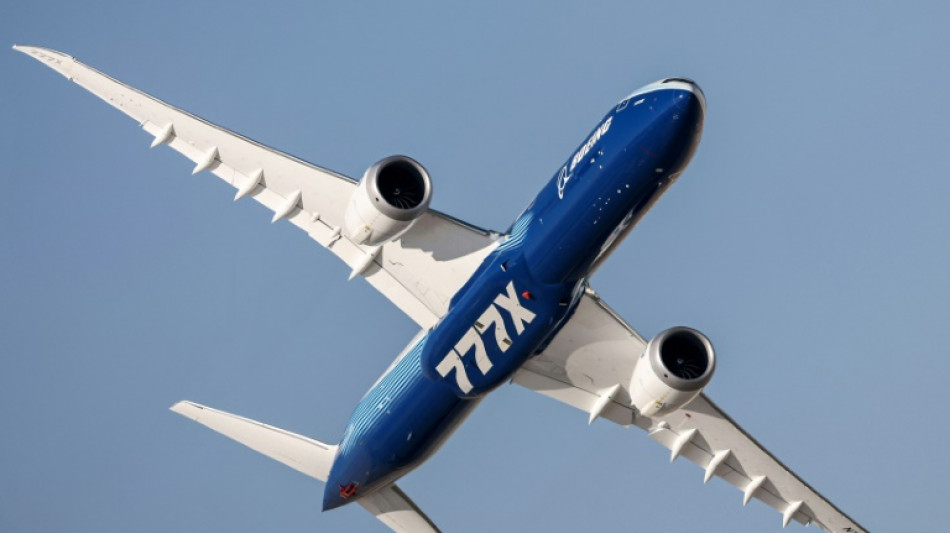

Boeing shares dive as 777X, Air Force One woes lead to $1.2 bn loss
Boeing shares were in free-fall Wednesday after the aviation giant reported a $1.2 billion loss in an ugly quarter weighed down by fresh one-time costs on its Russia business, the Air Force One presidential jet and the new 777X plane.
Shares were down more than nine percent at $151.26 in afternoon trading after Boeing's results badly missed analyst expectations and revealed yet another delay with its 777X model.
The loss marks the latest round of disappointing results for the commercial jet maker, which has also suspended deliveries of its 787 plane due to a series of production issues.
Offsetting those negatives somewhat has been the improvement in the commercial air market, as well as progress on ramping up deliveries of the 737 MAX, which was grounded for more than a year following two deadly crashes.
While acknowledging "messy" aspects to the report, Chief Executive Dave Calhoun urged a long-term perspective on the company.
"We are a long-cycle business, and the success of our efforts will be measured over years and decades, not quarters," Calhoun said in a message to employees.
"The deliberate actions we're taking now will drive stability in our operations and position us for long-term, sustainable performance."
But Calhoun faced pointed questions on an analyst call over the company's growing litany of problems, while asserting that the company was making progress on a turnaround.
The company's loss was more than twice the $537 million shortfall in the year-ago period. Revenues came in at $14 billion, down eight percent.
- Production costs rising -
Boeing said in a press release the new timeframe for the 777X, "reflects an updated assessment of the time to meet certification requirements," and also announced plans for a "temporary pause" on production for the aircraft through 2023.
The big US aerospace company now expects first deliveries of the plane in 2025, resulting in a $1.5 billion hit to profits.
Work on the 777X began in 2013, but the timeframe has been repeatedly pushed back as Boeing addresses certification questions from US air safety regulators.
Boeing's defense division booked about $1 billion in costs on the presidential plane, Air Force One, and a second military aircraft, the T-7A Red Hawk.
Air Force One suffered from "higher supplier costs, higher costs to finalize technical requirements and schedule delays," while the T-7A was beset with "supply chain constraints, Covid-19 and inflationary pressures," Boeing said.
Boeing has suspended engineering support, flight training and other services for Russia customers. The company had $212 million in costs in the quarter linked to Ukraine.
Boeing announced no new additional costs connected to the 787 Dreamliner, for which deliveries have been halted since May while it deals with problems raised by US air safety regulators.
Calhoun offered no timeframe on resuming 787 deliveries, but said the company had submitted its certification plan to the Federal Aviation Administration (FAA), calling it an "important step."
On the positive side, Boeing reported a jump in 737 MAX deliveries during the quarter and said it was on track to lift production of the plane to 31 per-month in the second quarter.
- Certification questions -
Calhoun also offered an upbeat view on the aviation market, pointing to a "broadening" recovery in commercial travel as "operators look to bring capacity back online and plan for growth."
Calhoun pushed back against analyst questions on whether the company suffered from systemic problems with its engineering department, saying an earlier reorganization he implemented to emphasize safety had helped.
The CEO said some of the latest charges were due to factors beyond the company's control, such as Covid-19 lockdowns and supply chain shortages that have raised costs.
But Calhoun acknowledged that Boeing is facing more scrutiny from air safety regulators that has broadly affected certification, including with the 777X and 787. The FAA came in for heavy criticism for its oversight of Boeing during the MAX's initial certification.
"It's changed," Calhoun said of how regulators approach certification. "They take a little longer than they used to. They're a little more thorough than they used to be. Boeing is better for it in the long run."
The myriad problems mean Boeing's operations will probably not "stabilize" until 2024 or 2025, said Michel Merluzeau, an analyst at AirInsight Group, adding that the company also appears to lack significant new commercial plane prospects for the 2030s.
P.Rossi--IM




